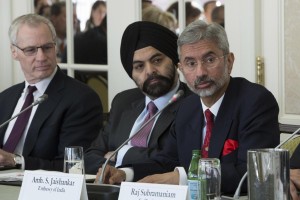With India facing the risk of a downgrade in its IPR status, the US- India Business Council (USIBC), the influential business lobby, is going all out to ensure that the country’s economic prospects are not adversely impacted by its current intellectual property regime. As per the Special 301 report that identifies trade barriers to US companies and products due to a foreign government’s intellectual property regime, lobbying efforts are underway by the business council to avoid downgrading of the IPR status.
USIBC president Dr. Mukesh Aghi has emphasised that the in the past one year there has been a significant improvement in India’s IP environment. “We are encouraged by the way things are trending,” he said. “USIBC members greatly appreciate the willingness of the Government of India to work with industry over the past year,” he added.
The US Trade Representative (USTR) prepares the report annually and the Indian government does not engage with the process as it considers it an infringement on the country’s sovereignty. USIBC is leaving no stone unturned to ensure that the India retains its current position, i.e on the ‘priority watch list’. The priority list has ‘countries of major concern’ to the US government. According to the Special 301 ranking, there are two categories worse than the priority list and India’s faces the risk of sliding down. The lowest category is likely to face US sanctions also.
According to the IP Index released recently by US Chamber of Commerce, the index had India at the lowest but one among 38 countries ranked, where Venezuela was the only other country that ranked below India. There are 350 companies investing India, who are members of USIBC (which is also part of the US Chamber of Commerce). The council aims to avert a potential setback to the USTR.
Under the submission list given by Dr. Aghi, a series of measures by the Indian government under Prime Minister Narendra Modi were listed out that have strengthened the IP regime in the country. Mr Aghi pointed out that the government did not appeal against the Delhi High Court’s decisions in MSD (Merck) v. Glenmark and Roche v. Cipla. “These decisions also reflected the increased capacity and competency of Indian judges to resolve patent infringement cases, assess damages, and order injunctive relief,” he said.
“USIBC also took notice that the Government of India has denied several compulsory license applications, providing investor certainty and predictability that their patents will be upheld in India,” the submitted list stated.
Once India releases its National IPR Policy that is awaited, USIBC told the USTR that it might amend its filing. Mr Aghi said that this will further articulate the government’s intentions to increase the protection of IPR. The USIBC has also urged the USTR to not alter India’s position in the report until the new national IPR policy is released.
Author Profile
- India Writes Network (www.indiawrites.org) is an emerging think tank and a media-publishing company focused on international affairs & the India Story. Centre for Global India Insights is the research arm of India Writes Network. To subscribe to India and the World, write to editor@indiawrites.org. A venture of TGII Media Private Limited, a leading media, publishing and consultancy company, IWN has carved a niche for balanced and exhaustive reporting and analysis of international affairs. Eminent personalities, politicians, diplomats, authors, strategy gurus and news-makers have contributed to India Writes Network, as also “India and the World,” a magazine focused on global affairs.
Latest entries
 DiplomacyJanuary 5, 2026India walks diplomatic tightrope over US operation in Venezuela
DiplomacyJanuary 5, 2026India walks diplomatic tightrope over US operation in Venezuela India and the WorldNovember 26, 2025G20@20: Africa’s Moment – The Once and Future World Order
India and the WorldNovember 26, 2025G20@20: Africa’s Moment – The Once and Future World Order DiplomacyOctober 4, 2025UNGA Resolution 2758 Must Not Be Distorted, One-China Principle Brooks No Challenge
DiplomacyOctober 4, 2025UNGA Resolution 2758 Must Not Be Distorted, One-China Principle Brooks No Challenge India and the WorldJuly 26, 2025MPs, diplomats laud Operation Sindoor, call for national unity to combat Pakistan-sponsored terror
India and the WorldJuly 26, 2025MPs, diplomats laud Operation Sindoor, call for national unity to combat Pakistan-sponsored terror








